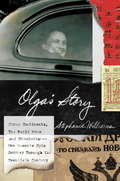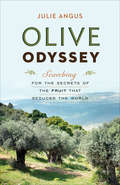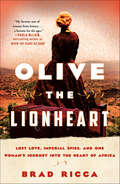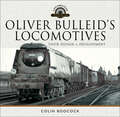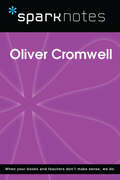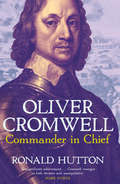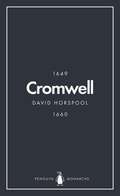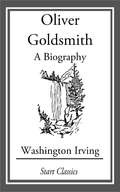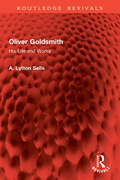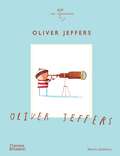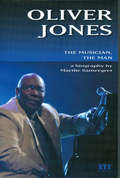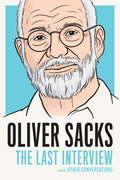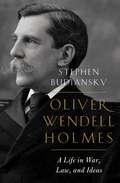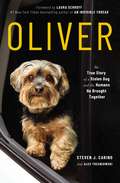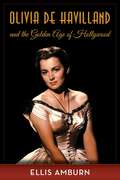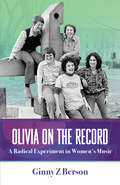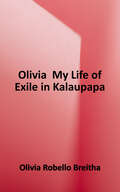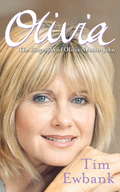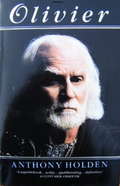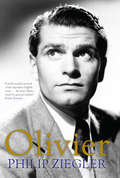- Table View
- List View
Olga's Story
by Stephanie WilliamsWhen Canadian journalist Stephanie Williams set out to discover her Russian grandmother' s long-lost history, what she unearthed was this stunning, sprawling portrait of a life lived on the grand stage of the 20th century. Born in remote Siberia in 1900, Olga Yunter was the youngest of five children. As a teenager during the Revolution, she was a courier and arms-runner for the White Russians. After learning of the execution of her brother at the hands of the Red Army, which drew nearer every day, her father sent her to China with rubies and gold sewn into her petticoats. She would never see her family again. The life of a Russian exile in China meant poverty and fear. But Olga was lucky. She met and married Fred Edney, and gave birth to their daughter, Irina, the author's mother. But the creeping Japanese occupation and invasion of China forced Olga to flee with Irina to Canada, leaving Fred behind to continue working. For five years she heard almost nothing of her husband, save that he was alive in a Japanese prison camp. At the end of the war she returned to China to find him broken by his internment. The family was driven out of the country for good by the Chinese Revolution in 1949. They settled in Oxford, where Olga and Fred lived out the rest of their days. Drawing on letters, diaries, government documents, and interviews, Stephanie Williams brings to life this gripping historical drama, sweeping in scope and illuminated by the intimate details of one woman's extraordinary life.From the Hardcover edition.
Olive Custance: Her Life and Work
by Brocard SewellA colorful and critical biography of the Victorian Fin-de-Siecle poetess Olive Custance (Lady Alfred Douglas).
Olive Odyssey: Searching for the Secrets of the Fruit that Seduced the World
by Julie AngusThis Mediterranean travel memoir offers &“an engaging mix of history, food travelogue, and botany lesson . . . There is much to enjoy here&” (Library Journal). Inspired by her Syrian forebears&’ intimate relationship with the olive, Julie Angus embarks on a voyage around the Mediterranean to unlock the secrets of the fruit that meant so much to them. Accompanied by her husband and their ten-month-old son, Angus collects samples from ancient trees to determine where the first olive tree originated; feasts on inky black tapenades and codfish drizzled with olive oil, among many other delights; witnesses the harvesting of olives in Greece; and visits perhaps the oldest olive tree in the world, on Crete. The result is a fascinating history and biography of this most influential and irresistible fruit. &“It is a pleasure to try to keep up with this book; like its author, it covers an enormous amount of territory.&” —Christopher Bakken, Wall Street Journal
Olive the Lionheart: Lost Love, Imperial Spies, and One Woman's Journey into the Heart of Africa
by Brad Ricca"Brad Ricca’s Olive MacLeod is my favorite sort of woman from history—bold and unconventional, utterly unsinkable—and her story is so full of adventure and acts of courage, it’s hard to believe she actually lived. And yet she did! Brad Ricca has found a heroine for the ages, and written her tale with a winning combination of accuracy and imagination." — Paula McLain, author of Love and Ruin and The Paris WifeFrom the Edgar-nominated author of the bestselling Mrs. Sherlock Holmes comes the true story of a woman's quest to Africa in the 1900s to find her missing fiancé, and the adventure that ensues.In 1910, Olive MacLeod, a thirty-year-old, redheaded Scottish aristocrat, received word that her fiancé, the famous naturalist Boyd Alexander, was missing in Africa.So she went to find him.Olive the Lionheart is the thrilling true story of her astonishing journey. In jungles, swamps, cities, and deserts, Olive and her two companions, the Talbots, come face-to-face with cobras and crocodiles, wise native chiefs, a murderous leopard cult, a haunted forest, and even two adorable lion cubs that she adopts as her own. Making her way in a pair of ill-fitting boots, Olive awakens to the many forces around her, from shadowy colonial powers to an invisible Islamic warlord who may hold the key to Boyd’s disappearance. As these secrets begin to unravel, all of Olive’s assumptions prove wrong and she is forced to confront the darkest, most shocking secret of all: why she really came to Africa in the first place.Drawing on Olive’s own letters and secret diaries, Olive the Lionheart is a love story that defies all boundaries, set against the backdrop of a beautiful, unconquerable Africa.This book is not for sale in the United Kingdom.
Oliver Bulleid's Locomotives: Their Design & Development (Locomotive Portfolio)
by Colin BoocockA history of the man who served as Chief Mechanical Engineer for the Southern Railway and the many locomotives he developed.Oliver Bulleid’s locomotives guides the reader in the quest to understand what motivated Mr Bulleid in his work as a senior engineer and manager, and tries, with as little bias as is reasonable, to make sense of some of the more controversial aspects of his activities. For example, why did OVB not pursue the ideal of a 2-8-2 for the Southern Railway? How did the ‘Leader’ project go so much out of control? What role did Bulleid play in the massive dieselization program in Ireland when he was CME there? How did the 0-6-6-0T turf-burning steam locomotive fit in with Ireland’s traction policy, or did it? And why did ninety of his steam locomotives and ninety-four of ‘his’ diesels have to be rebuilt to make them either more economical or more reliable?These are fundamental questions to which the book provides the reader with answers based on the author’s experiences or on those of people who knew Bulleid. OVB’s undoubted successes are illustrated in words and photographs, too, to provide a hopefully balanced picture of one of Britain’s more exciting railway engineers.“This book is a well written overview of the Bulleid era, by a competent engineer who can express himself in layman’s terms.” —Martin Shill, Industrial Railway Society“The book deserves a place on the bookshelf of every student of locomotives, especially Bulleid's By current standards, it is good value, and it was a pleasure to examine it.” —The Railway Observer
Oliver Cromwell (SparkNotes Biography Guide)
by SparkNotesOliver Cromwell (SparkNotes Biography Guide) Making the reading experience fun! SparkNotes Biography Guides examine the lives of historical luminaries, from Alexander the Great to Virginia Woolf. Each biography guide includes:An examination of the historical context in which the person lived A summary of the person&’s life and achievements A glossary of important terms, people, and events An in-depth look at the key epochs in the person&’s career Study questions and essay topics A review test Suggestions for further reading Whether you&’re a student of history or just a student cramming for a history exam, SparkNotes Biography guides are a reliable, thorough, and readable resource.
Oliver Cromwell: Commander in Chief
by Ronald HuttonThe second volume in an acclaimed biography of Oliver Cromwell, from the capture of Charles I to the expulsion of the Long Parliament In 1647, the Parliamentarians were divided. They had won the first civil war and the king was in custody, but disagreements over the way forward had led to a stalemate. As the leader of one party, Oliver Cromwell found himself again at the centre of events. In the second volume of his pioneering biography, Ronald Hutton traces Cromwell&’s career from 1647 through to his seizure of supreme power. These decisive years saw the execution of Charles I and the establishment of the Commonwealth of England, as well as notorious and savage campaigns in Ireland and Scotland. Cromwell&’s political and military leadership were well honed after years of practice, but this was also the period of his greatest ruthlessness and brutality. This groundbreaking account reveals a different kind of Cromwell, showing how he navigated the many forces ranged against him—and rose to the pinnacle of his power.
Oliver Cromwell: England's Protector (Penguin Monarchs)
by David HorspoolAlthough he styled himself 'His Highness', adopted the court ritual of his royal predecessors, and lived in the former royal palaces of Whitehall and Hampton Court, Oliver Cromwell was not a king - in spite of the best efforts of his supporters to crown him.Yet, as David Horspool shows in this illuminating new portrait of England's Lord Protector, Cromwell, the Puritan son of Cambridgeshire gentry, wielded such influence that it would be a pretence to say that power really lay with the collective. The years of Cromwell's rise to power, shaped by a decade-long civil war, saw a sustained attempt at the collective government of England; the first attempts at a real Union of Britain; the beginnings of empire; a radically new solution to the idea of a national religion; atrocities in Ireland; and the readmission to England of the Jews, a people officially banned for over three and a half centuries. At the end of it, Oliver Cromwell had emerged as the country's sole ruler: to his enemies, and probably to most of his countrymen, his legacy looked as likely to last as that of the Stuart dynasty he had replaced.
Oliver Goldsmith: A Biography
by Washington IrvingWashington Irving (April 3, 1783 - November 28, 1859) was an American author of the early 19th century. Best known for his short stories The Legend of Sleepy Hollow and Rip van Winkle (both of which appear in his book The Sketch Book of Geoffrey Crayon), he was also a prolific essayist, biographer and historian. Irving and James Fenimore Cooper were the first American writers to earn acclaim in Europe, and Irving is said to have encouraged authors such as Nathaniel Hawthorne, Henry Wadsworth Longfellow, and Edgar Allan Poe. Irving was also the U.S. minister to Spain 1842-1846.
Oliver Goldsmith: His Life and Works (Routledge Revivals)
by A. Lytton SellsIn view of the author of Oliver Goldsmith (originally published in 1974), the many biographies which have appeared seem defective in several respects. They either omit information which is readily available, or ignore essential features of Goldsmith’s life and character, or fail to see the real problems which should be considered; they are too prone to pass over or make light of Goldsmith’s faults. Dr Lytton Sells decided, therefore, that he would have to go back to the sources and to think out his character afresh. There are strange gaps in the records of Goldsmith’s life, and many questions that remain unanswered. Goldsmith kept no journal and few of his letters have survived. He was an inveterate liar, and we cannot often give credence to what he tells us about himself. This is what makes the biographer’s task a difficult one; nevertheless, Dr Lytton Sells has tackled it with great enthusiasm and insight and has given us a life that is both sound and readable and takes account of all the evidence available. And to this he has added a full-length study of the works which will be invaluable to any student of English literature.
Oliver Jeffers (The Illustrators)
by Martin SalisburyAn overview of the life and work of the Northern Irish illustrator, bookmaker, painter, designer, activist, and global superstar in the world of visual communication. A phenomenon of twenty-first-century bookmaking, Oliver Jeffers's energy and curiosity has driven an extraordinary career that shows no sign of slowing. Only in his forties, he has published an array of hugely popular books, both as illustrator and author-illustrator, including How to Catch a Star and Begin Again. This overview of his life and work so far will chart his passion for the environment and his quest to understand humanity's major challenges, and the impact this has had on his creative and intellectual output. The list of Jeffers's accomplishments is long and glittering: he has been granted numerous one-man shows both in the United Kingdom and the United States and was appointed an MBE in 2022 for services to the arts. Most importantly, however, he has tirelessly pushed the boundaries of what a picturebook can be, both in terms of structure and content. His regular exploration of existential issues, both through illustration and other media, such as site-specific installation, has exerted a major influence on the practice of authorial picturebook-making. His works have been translated into multiple languages and into other media, including full-length animated films, such as Lost and Found.
Oliver Jones
by Marthe SansregretBorn in Montreal, Oliver Jones performed his first piano concert at five years old. He has become one of the most celebrated representatives of the Montreal Jazz Festival and a worldwide musical ambassador for Canada on many international tours. This exclusive authorized biography begins with his roots the enslavement of his African ancestors and immigration of his parents to Canada from Barbados and takes us to the present. Oliver Jones has received many awards to recognize his achievements, both as a musician and as a human being: the Martin Luther King Award, a Juno Award, the Cool Jazz Award of the Izzy Asper Foundation, the Order of Canada, the Order of Quebec, the Oscar Peterson Award, the Governor Generals Performing Arts Award, and in 2006, two National Jazz Awards: Best Jazz Keyboard of the Year and Best CD with Ranee Lee for their album Just You, Just Me
Oliver Sacks: The Last Interview
by Oliver SacksAn extraordinary collection of interviews with the beloved doctor and author, whose research and books inspired generations of readers.Oliver Sacks--called "the poet laureate of medicine" by the New York Times--illuminated the mysteries of the brain for a wide audience in a series of richly acclaimed books, including Awakenings and The Man Who Mistook His Wife for a Hat, and numerous The New Yorker articles. In this collection of interviews, Sacks is at his most candid and disarming, rich with insights about his life and work. Any reader of Oliver Sacks will find in this book an entirely new way of looking at a brilliant writer.
Oliver Wendell Holmes: A Life In War, Law, And Ideas
by Stephen BudianskyThe extraordinary story of the U.S. Supreme Court’s most influential justice. Oliver Wendell Holmes twice escaped death as a young Union officer in the Civil War when musket balls missed his heart and spinal cord by a fraction of an inch at the Battles of Ball’s Bluff and Antietam. He lived ever after with unwavering moral courage, unremitting scorn for dogma, and an insatiable intellectual curiosity. Named to the Supreme Court by Theodore Roosevelt at age sixty-one, he served for nearly three decades, writing a series of famous, eloquent, and often dissenting opinions that would prove prophetic in securing freedom of speech, protecting the rights of criminal defendants, and ending the Court’s reactionary resistance to social and economic reforms. As a pioneering legal scholar, Holmes revolutionized the understanding of common law by showing how the law always evolved to meet the changing needs of society. As an enthusiastic friend and indefatigable correspondent, he wrote thousands of personal letters brimming with humorous philosophical insights, trenchant comments on the current scene, and an abiding joy in fighting the good fight. Drawing on many previously unpublished letters and records, Stephen Budiansky’s definitive biography offers the fullest portrait yet of this pivotal American figure, whose zest for life, wit, and intellect left a profound legacy in law and Constitutional rights, and who was an inspiring example of how to lead a meaningful life in a world of uncertainty and upheaval.
Oliver: The True Story of a Stolen Dog and the Humans He Brought Together
by Alex Tresniowski Steven J. CarinoHe Was Searching for a Lost Dog. He Found More Than He&’d Ever Hoped For.On Valentine&’s Day 2019, someone stole Steven Carino&’s dog, Oliver, from his car. Having lost his mother at thirteen and grown up with an alcoholic father, he could always count on his dogs for comfort and company. But now, with his beloved Oliver missing, Steven felt utterly alone.Then, the miracle. In a series of near-impossible coincidences, people from different walks of life crossed paths with Oliver and with Steven. Hardworking immigrants, wealthy suburbanites, car mechanics, deli workers, old friends, close relatives, street cops, gang members, a TV news reporter, social media followers around the world, and one very gifted hairdresser all played a part in Steven&’s desperate journey to find Oliver. In the middle of it all, Steven realized that no one is ever truly alone--and that the power of community can be life-changing.Oliver is not just a book about a stolen dog. At its core, it&’s a story about kindness, friendship, and the power of faith. As Steven says, &“This is more than just a dog story. This is an everybody story. This is a love story.&”
Olivia Rodrigo: All Access
by Emma Carlson BerneAre you obsessed with Olivia Rodrigo or is she just a stranger?Get to know the real Olivia Rodrigo in this biography that's packed with fun facts, stats, top tens, listicles, and lots more! Grab your driver's license and follow Olivia's journey from High School Musical: The Musical: The Series to GUTS and beyond!It's all inside this book — Olivia's teenage dreams, her embarassing love stories, her grudges, her gut-spilling, and her friends and fans. Plus, you'll be obsessed with discovering Olivia's faves — sour foods, lyrics, fellow musicians, and much more!With eight pages of full-color photos, this book is good 4 u!
Olivia de Havilland and the Golden Age of Hollywood
by Ellis AmburnThis is classic Hollywood history as told through the life and career of one of its mosticonic actresses. The book benefits tremendously from the author's meeting with Olivia de Havilland after he was assigned to handle her projected memoir at the Delacorte Press in 1973. Amburn also knew many of the key figures in her life and career, a veritable pantheon of Hollywood royalty from the 30s, 40s, and 50s: Jimmy Stewart, George Cukor, and David O. Selznick, and he was an editor at William Morrow when the company published the autobiography of de Havilland's difficult sister Joan Fontaine.Superbly researched and full of delicious anecdotes about Clark Gable, John Huston, Vivien Leigh, Laurence Olivier, Montgomery Clift, Errol Flynn, David Niven, and Bette Davis--particularly the bloody, bone-crunching fistfight Flynn and Huston waged over Olivia--this book not only profiles one of the finest actresses of her time, but also the culture of the film industry's Golden Age.It details de Havilland's relationships with the men who sought her--Howard Hughes, Jimmy Stewart, Errol Flynn, John F. Kennedy, Burgess Meredith, and John Huston, as well as her friendships with Grace Kelly, British Prime Minister Edward Heath, Ronald Reagan, Victor Fleming, and Ingrid Bergman.Here, too, are the fabulous and often surprising back stories of her 49 films, including Gone With the Wind, The Adventures of Robin Hood, The Snake Pit, Hush . . . Hush, Sweet Charlotte, and the two for which she won Oscars, The Heiress and To Each His Own. The account of the filming of Gone With the Wind is unique in that the author interviewed many of the people involved in the epic making of this masterpiece as Lois Dwight Cole, who discovered the novel, producer David O. Selznick, director George Cukor, agents Kay Brown and Annie Laurie Williams, Radie Harris, Vivien Leigh's closest friend in the press, and both Edie Goetz and Irene Mayer Selznick, daughters of Louis B. Mayer, head of MGM, the studio that funded, released, and ended up owning Gone With the Wind.Also included in this biography are Olivia's adventures with Bette Davis. They appeared together in four movies and Davis tried to destroy her, but Olivia stood up to Davis as no other actress had ever dared to do. She won Davis's respect, and by the time they made their biggest hit, Hush . . . Hush, Sweet Charlotte, a lasting friendship had blossomed. Undertaking a joint national publicity tour, they attracted mobs of boisterous fans and, in private, reminisced about the Golden Age of movies, evaluated the current crop of stars, and exchanged observations about love goddesses, nudity, and parenthood.
Olivia de Havilland: Lady Triumphant (Screen Classics)
by Victoria Amador&“There is much more to de Havilland&’s story than her role as Melanie Wilkes, and it&’s all here . . . a treat for film fans&” (Booklist).Two-time Academy Award winner Olivia de Havilland is best known for her role as Melanie Wilkes in Gone with the Wind. She often inhabited characters who were delicate, elegant, and refined; yet at the same time, she was a survivor with a fierce desire to direct her own destiny on and off the screen. She fought and won a lawsuit against Warner Bros. over a contract dispute that changed the studio contract system forever. She is also noted for her long feud with her sister, fellow actress Joan Fontaine—a feud that lasted from 1975 until Fontaine&’s death in 2013.Victoria Amador draws on extensive interviews and forty years of personal correspondence with de Havilland to present an in-depth look at her life and career.Amador begins with de Havilland&’s childhood—she was born in Japan in 1916 to affluent British parents who had aspirations of success and fortune in faraway countries—and her theatrical ambitions at a young age. The book then follows her career as she skyrocketed to star status, becoming one of the most well-known starlets in Tinseltown. Readers are given an inside look at her love affairs with iconic cinema figures such as James Stewart and John Huston, and her onscreen partnership with Errol Flynn, with whom she starred in The Adventures of Robin Hood and Dodge City. After she moved to Europe, de Havilland became the first woman to serve as the president of the Cannes Film Festival in 1965, and remained active in film and television for another two decades.Olivia de Havilland: Lady Triumphant is a tribute to one of Hollywood&’s greatest legends, tracing her evolution from a gentle heroine to a strong-willed, respected, and admired artist.
Olivia on the Record: A Radical Experiment in Women's Music
by Ginny Z BersonThe burgeoning lesbian and feminist movements of the '70s and '80s created an impetus to form more independent and equitable social and cultural institutions—bookstores, publishers, health clinics, and more—to support the unprecedented surge in women's arts of all kinds. Olivia Records was at the forefront of these models, not only recording and distributing women's music but also creating important new social spaces for previously isolated women and lesbians through concerts and festivals. Ginny Z. Berson, one of Olivia's founding members and visionaries, kept copious records during those heady days—days also fraught with contradictions, conflicts, and economic pitfalls. With great honesty, Berson offers her personal take on what those times were like, revisiting the excitement and the hardships of creating a fair and equitable lesbian-feminist business model—one that had no precedent.
Olivia: My Life of Exile in Kalaupapa
by Olivia Robello BreithaOlivia Robello Breitha was diagnosed with Hansen's disease (leprosy) when she was a young woman in the 1930s. At the time, there was no treatment for the disease and in Hawaii many people with leprosy were exiled to Kalaupapa, a community on the island of Molokai. Breitha, who had a 6th grade education, wrote her powerful story about living with the disease. At times they were treated inhumanely, mostly by doctors and medical professionals, and Breitha was unafraid to fight for patient rights and reducing stigma.
Olivia: The Biography of Olivia Newton-John
by Tim EwbankNow approaching her 60th birthday, Olivia Newton-John still exudes star power and timeless glamour. She has sold 60 million records around the world, topped the charts in the US and the UK four times, and is known all over the world for her role as Sandy opposite John Travolta in Grease. But behind the successful singing and film career lies the story of a remarkable survivor. Olivia's life has been repeatedly touched by trauma, heartache, personal tragedy and her own life-threatening cancer. Tim Ewbank's revealing biography charts the highs and lows of her career, and the personal crises that have affected her personal life - but never defeated her.
Olivia: The Biography of Olivia Newton-John (Virago Modern Classics Ser.)
by Tim EwbankNow approaching her 60th birthday, Olivia Newton-John still exudes star power and timeless glamour. She has sold 60 million records around the world, topped the charts in the US and the UK four times, and is known all over the world for her role as Sandy opposite John Travolta in Grease. But behind the successful singing and film career lies the story of a remarkable survivor. Olivia's life has been repeatedly touched by trauma, heartache, personal tragedy and her own life-threatening cancer. Tim Ewbank's revealing biography charts the highs and lows of her career, and the personal crises that have affected her personal life - but never defeated her.
Olivier
by Anthony HoldenThis is a biography of Laurence Olivier, the actor, director, impresario, founder of the National Theatre, Oscar-winning film star and the first peer in the history of the profession.
Olivier
by Anthony HoldenThis is a biography of Laurence Olivier, the actor, director, impresario, founder of the National Theatre, Oscar-winning film star and the first peer in the history of the profession.
Olivier
by Philip ZieglerA finalist for the Sheridan Morley Prize that has been called "probably the best Olivier book for general readers" (Kirkus Reviews), Philip Ziegler's Olivier provides an incredibly accessible and comprehensive portrait of this Hollywood superstar, Oscar-winning director, and one who is considered the greatest stage actor of the twentieth century. The era abounded in great actors--Gielgud, Richardson, Guinness, Burton, O'Toole - but none could challenge Laurence Olivier's range and power. By the 1940s he had achieved international stardom. His affair with Vivien Leigh led to a marriage as glamorous and as tragic as any in Hollywood history. He was as accomplished a director as he was a leading man: his three Shakespearian adaptations are among the most memorable ever filmed. And yet, at the height of his fame, he accepted what was no more than an administrator's wage to become the founding Director of the National Theatre. In 2013 the theatre celebrates its fiftieth anniversary; without Olivier's leadership it would never have achieved the status that it enjoys today. Off-stage, Olivier was the most extravagant of characters: generous, yet almost insanely jealous of those few contemporaries whom he deemed to be his rivals; charming but with a ferocious temper. With access to more than fifty hours of candid, unpublished interviews, Ziegler ensures that Olivier's true character--at its most undisguised--shines through as never before.
